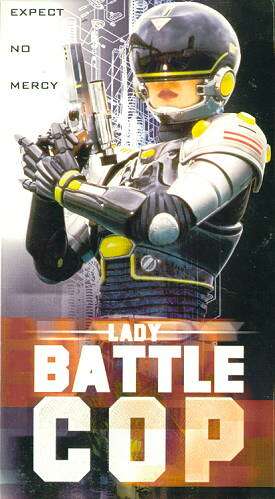★★★½
“Muroga reclaims for Japan, what Clint and Sergio borrowed in the 1960’s.”
 If the inspiration for this one wasn’t clear, Goro Yasukawa’s score will soon enlighten you: Sergio Leone. A character with a mysterious past and equally obscure agenda comes into a lawless town, and kicks ass. For The Man With No Name and his horse, read Saki (Yonekura) and her Harley. Given that Leone basically ripped off Akira Kurosawa’s Yojimbo in A Fistful of Dollars to begin with, the irony is satisfying. She has come to Tsuson – surely a nod to Tucson, less than two hours down the dusty Arizona I-10 from where I write this – to take on Tojo (Tsurumi), the local mob boss, who commits his crimes with impunity from the safety of an American Air Force base. She gets his attention when she interferes with his robbery of a wages truck, and takes the money herself. The two had met previously, though Tojo doesn’t recognise Saki; you’ll probably work out the basic circumstances long before the film reveals them, but it does add a couple of unexpectedly nasty twists of the knife.
If the inspiration for this one wasn’t clear, Goro Yasukawa’s score will soon enlighten you: Sergio Leone. A character with a mysterious past and equally obscure agenda comes into a lawless town, and kicks ass. For The Man With No Name and his horse, read Saki (Yonekura) and her Harley. Given that Leone basically ripped off Akira Kurosawa’s Yojimbo in A Fistful of Dollars to begin with, the irony is satisfying. She has come to Tsuson – surely a nod to Tucson, less than two hours down the dusty Arizona I-10 from where I write this – to take on Tojo (Tsurumi), the local mob boss, who commits his crimes with impunity from the safety of an American Air Force base. She gets his attention when she interferes with his robbery of a wages truck, and takes the money herself. The two had met previously, though Tojo doesn’t recognise Saki; you’ll probably work out the basic circumstances long before the film reveals them, but it does add a couple of unexpectedly nasty twists of the knife.
The Okinawan setting is interesting, given tension between US forces there and the locals, dating back to a 1995 incident when three servicemen raped a 12-year old girl. Hence, the scene where Yuki demolishes two leering US soldiers has an additional level of resonance for local viewers, and the tolerance of the Americans to a brutal thug on their territory become somewhat more explicable. Yonekura is impressive in her role, and Muroga wisely doesn’t bother to introduce any love interest; the film is barely an hour long, so there just wouldn’t be room. The inevitability of the final Suki-Tojo faceoff is perhaps only exceeded by its ludicrousness – the heroine expands the definition of “unarmed” to include other limbs too. However, for an obviously low-budget work, it’s busily energetic, and rarely slides much below entertaining.
Dir: Atsushi Muroga
Star: Ryoko Yonekura, Shingo Tsurumi, Takeshi Yamato, Takashi Ukaji





 Another title in the ongoing Metropolitan Police Branch series, has much the same ingredients as the other entries: cheesecake and mildly competent action. I think this is the second entry, but as the three films have three different pairs of actresses playing policewomen heroines Mika and Rin (Hara + Iijima in this case), it’s clear continuity is less the purpose of the exercise than the aforementioned C + MCA.
Another title in the ongoing Metropolitan Police Branch series, has much the same ingredients as the other entries: cheesecake and mildly competent action. I think this is the second entry, but as the three films have three different pairs of actresses playing policewomen heroines Mika and Rin (Hara + Iijima in this case), it’s clear continuity is less the purpose of the exercise than the aforementioned C + MCA.
 This inspired film came about as the result of a bet at the Berlin Film Festival between Tsutsumi and Azumi director Ryuhei Kitamura (who is also doing the next Godzilla movie): make a film about a duel to the death, with just one setting, two characters, and seven days shooting. Kitamura made Aragami about two samurai in a temple; Tsutsumi, however, came up with this, about two warring flatmates (the title is Japanese shorthand for an apartment with 2 bedrooms, a living-room, a dining-room and a kitchen – luxurious by the cramped standards of their cities). Specifically, two actresses who, over the course of an evening, discover they are not only the final contenders for the same part, they also want the same man…
This inspired film came about as the result of a bet at the Berlin Film Festival between Tsutsumi and Azumi director Ryuhei Kitamura (who is also doing the next Godzilla movie): make a film about a duel to the death, with just one setting, two characters, and seven days shooting. Kitamura made Aragami about two samurai in a temple; Tsutsumi, however, came up with this, about two warring flatmates (the title is Japanese shorthand for an apartment with 2 bedrooms, a living-room, a dining-room and a kitchen – luxurious by the cramped standards of their cities). Specifically, two actresses who, over the course of an evening, discover they are not only the final contenders for the same part, they also want the same man… It’d probably be best to watch the original film, Poly Matrix, immediately before this, as otherwise, you’ll be kinda hitting the ground running. After those events, Ross Syllabus and “Third” [a model of android which can reproduce] Armitage have set up home with their daughter, who doesn’t know her mother is anything by human; meanwhile Ross operates under an assumed name as a security guard. However, an incident turns him into an unwilling spokesman for robot rights once again, and when he is sent to Earth as a Martian delegate, his daughter Yoko is kidnapped by a faction seeking to reverse his vote. It’s time for Armitage to put aside her chores and kick butt.
It’d probably be best to watch the original film, Poly Matrix, immediately before this, as otherwise, you’ll be kinda hitting the ground running. After those events, Ross Syllabus and “Third” [a model of android which can reproduce] Armitage have set up home with their daughter, who doesn’t know her mother is anything by human; meanwhile Ross operates under an assumed name as a security guard. However, an incident turns him into an unwilling spokesman for robot rights once again, and when he is sent to Earth as a Martian delegate, his daughter Yoko is kidnapped by a faction seeking to reverse his vote. It’s time for Armitage to put aside her chores and kick butt.
 Despite an overall rating that is only mildly above average, when this is good, it is
Despite an overall rating that is only mildly above average, when this is good, it is 
 Cutting to the chase; the action is excellent, with several sequences which would be fitting climaxes to any other movie. When you see this one’s finale, you’ll realise why they’re not: Azumi’s master is captured, and an entire town of sword-wielding rogues and assorted scum is in her way, plus villain #1, a rose-wielding psychopath who dresses in white (Odagiri). Settle back, and pass the popcorn. While the swordplay itself is mostly nothing special (save one Very Special decapitation), Kitamura captures it beautifully, the visual highlight being a full circle around two characters – vertically. The sound is also fabulous; you could close your eyes and just listen to the battles.
Cutting to the chase; the action is excellent, with several sequences which would be fitting climaxes to any other movie. When you see this one’s finale, you’ll realise why they’re not: Azumi’s master is captured, and an entire town of sword-wielding rogues and assorted scum is in her way, plus villain #1, a rose-wielding psychopath who dresses in white (Odagiri). Settle back, and pass the popcorn. While the swordplay itself is mostly nothing special (save one Very Special decapitation), Kitamura captures it beautifully, the visual highlight being a full circle around two characters – vertically. The sound is also fabulous; you could close your eyes and just listen to the battles. As a rule, we don’t watch dubbed anime, finding it a painful experience; unfortunately, this version, which compacts four OAVs into a feature, is
As a rule, we don’t watch dubbed anime, finding it a painful experience; unfortunately, this version, which compacts four OAVs into a feature, is  When the island site of a proposed resort starts seeing mutilated bodies turn up, they call in Feng Shui specialist Mayuko (Tanaka) to investigate. However, as she herself discovers, she’s no ordinary psychic, but the next in a line of guardians dedicated to stopping demons from entering the human world. With the aid of some conveniently informative dreams, a down-to-earth cop (pro-wrestler Mutoh, known in the West as The Great Muta) and a sword she finds underwater, it’s up to Mayuko to stop the Hellmouth from openi…er, save the world.
When the island site of a proposed resort starts seeing mutilated bodies turn up, they call in Feng Shui specialist Mayuko (Tanaka) to investigate. However, as she herself discovers, she’s no ordinary psychic, but the next in a line of guardians dedicated to stopping demons from entering the human world. With the aid of some conveniently informative dreams, a down-to-earth cop (pro-wrestler Mutoh, known in the West as The Great Muta) and a sword she finds underwater, it’s up to Mayuko to stop the Hellmouth from openi…er, save the world. At least, so claims one of the songs in this largely ineffective movie, about professional tennis starlet Kaoru – Anna Kournikova will be in the Hollywood remake, no doubt – who is transformed into a crime-fighting machine. This takes place after she is killed by the Cartel, a crime syndicate bent on taking over Japan, despite apparently having about seven members. They do, however, have a “psychic robot” called Amadeus, which is probably the sole original thought in the entire film, and the whole thing gets kicked up a notch during his battles. The interesting question of where he came from (apparently a NASA creation), is never explored. This is a shame, since it’d be rather more interesting than almost anything the film actually offers.
At least, so claims one of the songs in this largely ineffective movie, about professional tennis starlet Kaoru – Anna Kournikova will be in the Hollywood remake, no doubt – who is transformed into a crime-fighting machine. This takes place after she is killed by the Cartel, a crime syndicate bent on taking over Japan, despite apparently having about seven members. They do, however, have a “psychic robot” called Amadeus, which is probably the sole original thought in the entire film, and the whole thing gets kicked up a notch during his battles. The interesting question of where he came from (apparently a NASA creation), is never explored. This is a shame, since it’d be rather more interesting than almost anything the film actually offers.